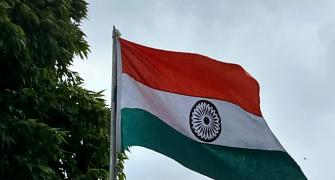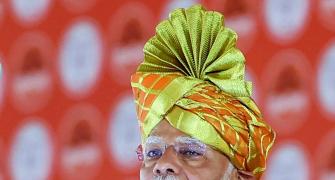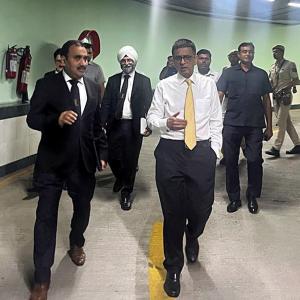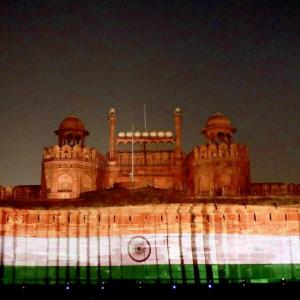Chief Justice of India (CJI) D Y Chandrachud on Tuesday said the greatest challenge before the Indian judiciary is to eliminate barriers to accessing justice and make sure that the judiciary is inclusive and accessible to the last person in the line.

Soon after being lauded by Prime Minister Narendra Modi in his address to the nation on the Independence Day for the apex court's move to translate operative parts of judgements in regional languages, the CJI said till now, 9,423 judgements of the top court have been translated in regional languages.
Speaking at the Independence Day celebrations organised by the Supreme Court Bar Association (SCBA) at the apex court lawns, the CJI also talked about efforts of the apex court to make all its 35,000 judgements available to citizens in regional languages.
He also said that there is a need to overhaul the infrastructure on a priority basis to make courts accessible and inclusive.
Union Law Minister Arjun Ram Meghwal, who was also present at the 77th Independence Day function of SCBA, said a roadmap was essential for making India a developed nation by 2047 and termed the rule of law the foundation of democracy.
Justice Chandrachud, in his address after unfurling the national flag in the apex court lawns, said the aim of the top court is to create a judicial system which is more accessible and cost-effective for the people and that full potential of technology has to be tapped to overcome the procedural barriers to justice.
Besides the CJI and the law minister, several apex court judges, Attorney General R Venkataramani, SCBA office bearers, including its president and senior advocate Adish C Aggarwala and secretary Rohit Pandey, were present during the programme.
During his address, the CJI said over 19,000 cases have been disposed of by the top court between March and June this year.
"As I look to the future, I believe the greatest challenge before the Indian judiciary is to eliminate the barriers to accessing justice," he said.
"We have to enhance access to justice procedurally by eliminating the constraints which prevent citizens from approaching courts and substantively, by building confidence in the courts' ability to dispense justice and we have a roadmap in place to make sure that the future of Indian judiciary is inclusive and accessible to the last person in the line," the CJI said.
He also spoke about the plan to expand the apex court by constructing a new building to accommodate 27 additional courts, four registrar courtrooms and adequate facilities for lawyers and litigants.
He said to make the courts accessible and inclusive, 'we need to overhaul our court infrastructure on a priority basis'.
Justice Chandrachud said the emphasis on modernising the judicial infrastructure to meet the challenges of the future is key to this mission.
On the use of technology in the judicial process, the CJI said it is the best tool to eliminate inefficiency.
"We have to tap into the full potential of technology to overcome procedural barriers to justice. In pursuance of this, we are implementing phase three of the e-courts project," he said.
Justice Chandrachud said phase three of e-courts project has received a budgetary sanction of the Centre to the extent of Rs 7,000 crore and it seeks to revolutionise the working of courts by inter-linking all courts across the country, setting up infrastructure of paperless courts, digitisation of court records and setting of advance e-sewa kendras in all court complexes.
"Our aim is to create a judicial system that is more accessible, cost-effective and affordable for every individual who seeks justice. We are already striving to make the court premises and court services disabled-friendly," he said.
The CJI also talked about efforts to make all SC judgements available to citizens in regional languages.
"I must also share with you that the prime minister today, in the course of his Independence Day speech at the Red fort, mentioned about efforts of the Supreme Court to translate the judgements of the Supreme Court in Indian languages," he said.
"I would like to further elaborate on that and tell you that up to now, 9,423 judgements of the Supreme Court have been translated in regional languages," the CJI said, adding 8,977 judgements are in Hindi and also in languages like Assamese, Bengali, Gujarati, Kannada, Malayalam, Marathi, Punjabi, Tamil and Urdu.
The CJI said irrespective of the outcome of a case, he believes that the real strength of the system is granting access to justice to the citizens.
"If we glance at the last 76 years, we realise that each institution has contributed to strengthening our nation's soul and it is important that we recognise that all the institutions of our nation -- the executive, the legislature and the judiciary -- are associated with the common task of nation building," he said.
Justice Chandrachud said courts provide a safe democratic space for individuals to seek protection of their lives and liberties.
"The past 76 years suggest that the history of the Indian judiciary is the history of the daily life struggles of Indian people. If our history teaches us anything, it is this that no matter is big or small for the courts. It is in routinely small matters that issues of grave constitutional and jurisprudential importance emerge," he said.
The CJI said resolution of every legal grievance is important and in attending to such grievances, the courts are only performing their constitutional duty.
He also talked about the initiatives of the apex court, including live-streaming of court proceedings, to contribute to the transparency of the legal process.
Justice Chandrachud said it has been brought to his notice that verification of cases filed in the apex court takes time and he is working very closely to ensure that it is reduced.
Giving data about the number of cases filed and disposed of by the apex court, he said in March this year, 4,527 cases were filed, 22,282 cases were listed and 4,086 were disposed of.
The CJI said in April this year, 4,716 cases were filed while 4,700 were disposed of.
"Our aim for the future is to ensure that our judicial systems are capable of managing the expectations of the Indian people. Legitimacy of our institutions can be secured only when the courts establish themselves as robust, independent institutions," he said.
Law Minister Meghwal, in his short address delivered in Hindi, said while the 75 years of independence was being celebrated as 'Azadi ka Amrit Mahotsav', it also provided an opportunity to analyse the nation's journey and to find whether India had reached its destination.
"How it has been for the last 75 years, where we have reached, whether we have reached our destination or not...There is an opportunity to analyse all that. But where we will reach by 2047, the destination has been announced by the prime minister from the ramparts of the Red Fort today," he said.
Meghwal said a 'roadmap was essential" for making any nation a developed one.
"We have to prepare a roadmap.... Everyone has to move together, in the process of making India a developed nation," the law minister said.
Meghwal said a nation could not exist without the five essentials of a distinct geographical area, sovereignty, flag, currency and language.
He said according to Western philosophers, before the Magna Carta, there was a 'conflict between the rule of law and rule of man'.
Section 35 of the Magna Carta provided that in future there will be rule of law, which was the foundation of democracy, Meghwal said.
India, however, had a history of democratic traditions as seen in the 'sabhas' during the time of Gautam Buddha and as mentioned by Sant Ravidas and others, he said.
He assured the advocates that their issues, including those regarding the Advocate Protection Act and lawyers' chambers, were being looked into by the ministry.
Meghwal said the CJI was in the process of implementing several changes, including e-courts, use of artificial intelligence and strengthening the alternative dispute resolution mechanism.










